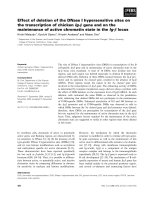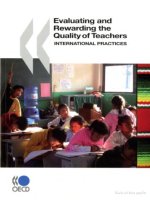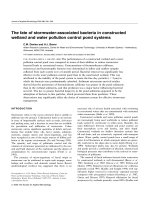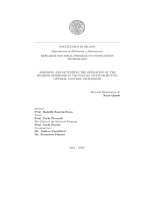Conservating and promoting the values of architectural - urban heritages of French colonial period in Savannakhet old quarter towards sustainable tourism
Bạn đang xem bản rút gọn của tài liệu. Xem và tải ngay bản đầy đủ của tài liệu tại đây (642.31 KB, 5 trang )
KHOA H“C & C«NG NGHª
Conservating and promoting the values of architectural
- urban heritages of French colonial period in
Savannakhet old quarter towards sustainable tourism
Bảo tồn và phát huy giá trị di sản kiến trúc - đô thị của thời kỳ Pháp thuộc tại khu phố cổ
Savannakhet hướng tới du lịch bền vững
Khamphouphet Vanivong*
Abstract
The paper referred to the features and
values of architectural - urban heritages of
French colonial period in the Savannakhet
old quarter. The paper included two main
contents: conserving and promoting those
values towards sustainable tourism. The
existing problems of the heritages in the
Savannakhet old quarter were the urban
– architectural status, socio – economic
development and environment which
also defined the features and values of
architectural- urban heritages and estimated
heritage potentials. Therefrom conserving
and promoting solutions were established
under the models of tourism and cultural
activities in the Savannakhet old quarter.
Key words: conservation, promotion,
sustainable, Savannakhet
Tóm tắt
Bài báo này đề cập đến các đặc điểm
và giá trị của di sản kiến trúc - đô thị
thời kỳ Pháp thuộc trong khu phố cổ
Savannakhet. Bài báo bao gồm hai nội
dung chính: bảo tồn và phát huy những
giá trị đó hướng với du lịch bền vững.
Các vấn đề hiện tại của di sản trong khu
phố cổ Savannakhet là hiện trạng đô thị
- kiến trúc, phát triển kinh tế - xã hội và
môi trường cũng xác định các đặc điểm
và giá trị của di sản kiến trúc đô thị và
tiềm năng di sản. Từ đó bảo tồn và thúc
đẩy các giải pháp được thiết lập theo các
mô hình du lịch và các hoạt động văn
hóa trong khu phố cổ Savannakhet.
Từ khóa: bảo tồn, thúc đẩy, bền vững,
Savannakhet
Khamphouphet Vanivong
PhD. Student, Ha Noi Architectural
University, 2014
Email:
Ngày nhận bài: 15/3/2018
Ngày sửa bài: 11/4/2018
Ngày duyệt đăng: 05/7/2018
18
1. Overview of the current situation of the Savannakhet old quarter
The Savannakhet old quarter was one of the five oldest French colonial quarters in
Laos which were built and developed in the early 20th century. The Savannakhet old
quarter was about 55,41ha, of which there were 95 houses in French colonial styles.
The Savannakhet old quarter used to be an important area in the southern part of
Laos. However after the end of the French colonial period in 1954, The Savannakhet
old quarter ended its development and could not keep its significance as before. The
quarter had gradually fallen into disrepair. As future provincial planning, the city center
would be move to the north and northeast parts which were far away from the old
quarter. The old quarter would be isolated and paid less attention.
Currently, Savannakhet province was undergoing rapid development with two
major projects funded by the government: Savan-Seno and SEZ (a special economic
zone connecting ASEAN and the world with the strategic route). Savannakhet city was
facing many problems in population, environmental, economy... These problems had
affected the Savannakhet old quarter clearly: the local people awareness in heritage
conservation was not high, the local authorities did not have heritage regulations and
management, many buildings in French colonial styles were destroyed, many historical
evidences of the valuable heritage had gone…
Therefore, due to the importance and urgency of the above-mentioned problems,
the local authorities, goverment departments, international experts and organizations,
and the local people were cooperating to each other in research, rehabilitation,
conservation and promotion of the potential values as well as a sustainable tourism
development plan in the quarter. The Savannakhet old quarter was one of the
integrated tourism development plans of Savannakhet. Cultural tourism was a model
that had been used sucessfully in the economic development of many old city in the
world because it promoted values and conserved cultural heritage at the same time.
Tourist activities could be organized and implemented in various ways depending on
the unique features of each city.
Conservation and promotion of architecture – urban heritages in the Savannakhet
old quarter, along the lines of sustainable culture, I proposed the potential assessment,
values, conservative solutions and models towards sustainable tourism in the
Savannakhet old quarter as follows:
1.1. Value assessment and preservation of architectural - urban heritages
Conservation and promotion of architectural- urban heritage values in the
Savannakhet old quarter followed research methodology:
- Identify research methods
- Learn lessons from other cases, including law enforcement, conservation
regulations, and the development of other old cities from all over the world and Lao
- Determine method and establish criteria of potential assessment of architecturalurban heritage which were appropriate to the current situations.
During structural assessment of architectural- urban heritage, I divided the
assessment process into two parts:
1) Urban potential assessment: divided the quarter into 4 specific zones: the North
zone, the Central zone, the Mekong Riverside zone, and the South zone. After that I
subdivided the quarter into suburban road network which consisted of 55 different subzones for more potential assessment.
2) Architectural potential assessment: potential assessment of each architectural
category: public architecture and housing architecture. Assessment of each
architectural category was done in term of architectural style, building technique and
T„P CHŠ KHOA H“C KI¦N TR”C - XŸY D¼NG
Figure 1: Potential assessment of architectural-urban heritage for conservation
Figure 2: The conservative boundary of the Savannakhet old quarter
building material, each term were defined as three levels: low
(I), middle (II) and high (III).
1.2. The results of conservative research and promotion of
heritage values
The survey of architectural-urban heritage assessment
in the Savannakhet old quarter lasted in 3 months with 120
questionnaires for 3 groups (the local people, government
officers and tourists). The result was withdrawn by average
scores (%), in which if the average score over 60%, the quarter
had potential of promotion, development and conservation.
The details will be summarized as below:
1.2.1Architectural - urban conservation
1) Urban conservation: The old quarter included two
conservation zones: the Core zone at level I and the Buffer
zone as the protective zone at level II. Besides that, a detailed
description of the conservation zones in each specific urban
zones in order to divide the conservation status of each zone:
the South zone, the Center zone, the Mekong riverside zone
and the North zone (all over 60%).
2) Architectural conservation: based on the critera of the
structural values over 60%, buildings had been evaluated as
high as:
S¬ 31 - 2018
19
KHOA H“C & C«NG NGHª
Figure 3: Map of the development of the old quarter center
Figure 4: Distribution model of tourist special areas
- Public architecture: architectural style (69%), building
techniques and materials (62%), function (60%).
- Housing architecture: single house, villa and pillar house
(all 75%), detached house and row house: 60%.
After result summarizing, together with the actual area
survey, I proposed some solution principles of conservation
in each building.
1.2.2Promotion of architectural-urban values towards
sustainable tourism
Promotion of architectural-urban heritage values towards
sustainable tourism should combined three sections: Public
administration officers – Local people - Travel agents. This
was the Co-development model with the same goal that
hold the architectural- urban heritage in the Savannakhet
old quarter as a tourist center. Then, I proposed a tourist
development plan suitable with the actual conditions in
the area, with the main focus on promoting and attracting
domestic and foreign visitors to the province and defining
the old quarter as a tourist center. This concept must be
20
implemented in the following steps:
• Open a wide range of tourist routes with tourist attractions
in the province and surrounding areas.
• Held traditional festivals in the quarter
• Open an appointment market with artistic, music, dance,
entertaining performances, grocery shopping...
• Establish the convenient tourist accesses to famous
historic sites and cultural attractions.
• Organize information systems for public outreach such
as: radio, TV, newspaper, magazine, internet, QR Code
scanner stick to location and products, banners, brochures
and posters.
• Create more services and facilitties for tourists such as
information centers, public buses, car rental services, parking,
mini-mart, guesthouses, ATMs, bathrooms, restaurants... to
cater both domestic and international travelers.
For these tourist activities in the quarter, I proposed a codevelopment model to promote tourism in a diagram:
T„P CHŠ KHOA H“C KI¦N TR”C - XŸY D¼NG
Figure 5: Route diagram for tourits in the old quarter
1) The public spatial model in the city
Based on the current features of the city’s overall urban structure/master plan at
the and the nearby tourist attractions, I proposed the concept on the development
of national urban network with the aim of setting the old Savannakhet quarter as a
central point of tourist attractions to allow tourists to travel and return to Savannakhet
city conveniently.
2) Spatial management and allocation in architecture and urban
Determine the classifying method of tourist areas, which was divided into 7
consecutive circle areas, each had diameter of 350 m:
“Circle Area: Urban form + Cultural heritage + Function”
3) Development of tourist routes in the old quarter
I proposed a concept of tourist route to make more convenient for tourists
by using public buses, motorbikes and bicycles. These routes would have the
necessary services for tourist demand.
1.3. The experimental concept design of the old quarter
Based on the realistic situation and concepts to promote the architectural –
urban heritage values towards sustainable tourist development, I proposed an
experimental concept design of two important zones: the center and the Mekong
riverside zone.
1) The Center zone:
The center zone included a public square (15 x 150m) surrounded by four
streets and many French colonial buildings, a prominent east corner was the
Catholic Church (St. Theresa’s Church, the only church built during the French
colonial period and now the centerpiece of the city center served as a daytime
holiday and a night market). The design would restore park with a new floor tile,
install lamps, colorful lamps, vertical garden and buildings, a small storehouse for
foods and drinks, a public bathroom and plant tree and flowerpot. The design goal
is to create a central public park and a relaxing place for both local people and
tourists.
2) The Mekong riverside zone
It is an area adjacent to the Mekong river and main street of the city, this area
expends from north to south, but public area was not large and consist many small
and high tree. The concept design would help to improve an area adjacent to street
to be public park for the rest place, with some parking lots, bus stations, children
playground, shopping mall, public bathroom ... Inside the park, there are paved
walking streets, seating places, sculptures, lanterns... Besides that, the Mekong
river bank area will create a small road parallel with the main road on top to a
walkway, riding a bicycle, sitting and a garden view of the river, which will built the
ladder connect to the top park area of the range for a period of time.
S¬ 31 - 2018
21
KHOA H“C & C«NG NGHª
Figure 6: The experimental Design of the city center and the Mekong River Bank of the French Quarter’s
2. Conclusion
The Savannakhet old quarter was one of the French
quarters in Laos with its potential for sustainable tourist
development. This development would maintain its unique
architectural - urban heritage - the most popular tourist
destinations in the world. However, because of the many
causes and factors affecting this old quarter, it was not able
to show its full potential. So studying and researching the
its architectural-urban heritage to promote unique cultural
values towards sustainable tourism was necessary and
urgent since they were not been properly maintained and
appropriately managed. Many buildings had been used in a
way that damaged and lost values in the past. Researching
to promote the cultural heritage values by the potential
heritage assessment and proposing a sustainable tourism
development and preservation of the cultural heritage of
architecture and urban in the old quarter was a concept and
a guidance to the development for the outsiders to recognize
and see the importance and values of this old quarter as part
of the national cultural heritage./.
References
1. Culture Department, Architecture and Urban Institute (Atetier
du Pratimoine IRU- IPRAUS): Projet d’ Inventaire et d’ Etude
du Pratimoine Architectural, Urbain & Paysager de la ville de
Vientiane, Năm 1999 - 2002.
2. Urban Research Institute, Ministry of Public Works and
Transport, Creating a plan to design a detailed map of the
new urban area in Kaysonephomvihane District, Savannakhet
Province, The research paper of Nik Keng Sek Ke, 2014.
3. Planning and Investment Department of Savannakhet Province,
Socio-economic development plans Five-Year, Seventh, 2015.
4. Culture and Tourism Department of Savannakhet Province, 2013
Statistical Report on Tourism in Laos.
5. ICOMOS - Culture and Information Department - Vietnam,
International Charters for Conservation and Restoration, 2013.
6. Science research project. (1997). Research and Study Old
building of French Colonial’s Architecture in the old city of
Savannakhet Project. Faculty of Architecture, University of Lao
22
T„P CHŠ KHOA H“C KI¦N TR”C - XŸY D¼NG
7. Ministry of Education and Sport. (2002).The history of Lao in the
period colonial from1893-1954.
8. (Atetier du Pratimoine IRU- IPRAUS), Projet d’ Inventaire et d’
Etude du Pratimoine Architectural, Urbain & Paysager de la
ville de Vientiane, 1999 - 2002.
9. Le Minh Son. (2013). Indochina Architecture : Construction
Printing House.
10.Richard Walter and Peter, Impact Tourism and Heritage Site
Management in the World Heritage Town of Luang Prabang,
2004.
11.Nahoum Cohen (1998), Urban Conservation, The MIT press
Cambridge, Massachusetts, pp 32-78,266-296.
12.Thongsay SAYAVONGKHAMDY, Vice Governor of SEZA,
Investment Opportunities in the SAVAN - SENO Special
Economic Zone (SASEZ), Bangkok, 2010.
13.East West Economic Corridor Tourism Promotion Project,
Project Prototype of Attractive Tourism Center in the East West
Economic Corridor for Community Empowerment and Poverty
Alleviation, JICA Project Team, 2008









